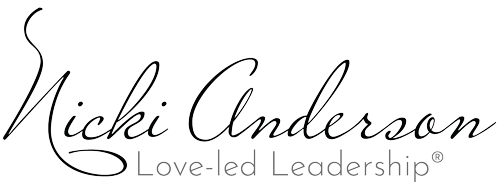Until we befriend our shadow, we’ll keep mistaking it for the enemy.” – N. Anderson
I’m going to admit something that’s not easy to write:
I’ve spent a long time judging and pointing fingers. It’s always been easier to spot the flaws in others than to face the ones in myself. And if I’m honest, there are still parts of me I struggle to accept, the parts I’ve tried to hide or ignore.
What changed everything for me was discovering the power of love. Not just in relationships, but as a foundation for leadership. That journey eventually led me to what I now call Love-Led Leadership™, a name that came to me about two years ago, though the passion behind it had been growing for much longer. That realization—that love could be a guidepost for how I lead—didn’t just shift how I showed up at work, it showed up in all areas of my life. It helped me to recognize that the world’s brokenness often mirrors our own.
Fixing Self Before Others
As I kept trying to “fix” a broken world, the Love-led Leadership™ principles taught me that I can’t heal what’s outside me until I begin to heal what’s within. In Carl Jung’s quote, “Your vision will become clear only when you can look into your own heart. Who looks outside, dreams who looks inside, awakes,” he makes clear the importance of self-reflection and introspection.
That introspection meant facing something I had long avoided: my shadow.
Carl Jung described the shadow as the parts of ourselves we disown—what we label “too much,” “not enough,” or simply “unacceptable.” Most of us are taught to hide these parts in order to be liked, accepted, or seen as strong. But the truth is, those parts don’t disappear. And if we’re not willing to meet them, we end up projecting them onto others and judging them there. It manifests as anger and intolerance.
Scapegoating
I used to think that if I could just do enough good (like fixing the world) or be the better person, I’d be okay. That maybe I could just bury the parts of myself I didn’t like. But that didn’t happen. Instead, they showed up in subtle, destructive ways—through blame, criticism, defensiveness, or judgment. That’s where scapegoating comes in.
It’s so tempting to point to someone else and say, “They’re the problem.” Especially in times like these, when the world feels divided, uncertain, and heavy. Scapegoating is the ego’s shortcut to feeling righteous. I’m going to say this again, because I think it’s so important, Scapegoating is the ego’s shortcut to feeling righteous. It tells us all sorts of things we want to hear to be affirmed. But all it really does is distract us from the deeper work we need to do in order to become a love-led leader.
Recognizing and accepting my own shadow
The more I’ve learned to recognize and accept my own shadow, the more compassion I’ve been able to offer others. Not because I’ve “figured it out” or I’m above it, but because I’ve become more accepting of myself. And that makes it so much easier to accept the imperfections in others because NONE of us are perfect. At the heart of it, I’m learning to recognize the humanity in myself, and therefore in everyone else. Can I tell you? It’s truly freeing. I’m not perfect, and it’s o.k. The world is not perfect, and it’s o.k.
We all have shadows. That doesn’t make us bad. It makes us human.
When we stop fighting those not-so-pretty parts of ourselves, we unlock something powerful: the ability to lead with empathy, not ego, with compassion, not control, and with love, not fear.
So, as you move through your week, I invite you to pause. Instead of pointing your finger at others, try asking, “What in me is asking to be seen and accepted?”
This isn’t about blame or shame. It’s about making space for honesty, for grace, for healing. Because the more we befriend our own shadows, the more space we create to meet others with love. And isn’t that the kind of world we want to live in? One shaped not by finger-pointing and fear, but by compassion, curiosity, and understanding.
Start there. Start small. Start inside. As for me? I’m a work in progress.
